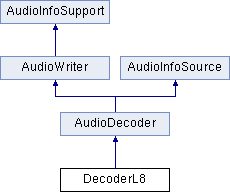DecoderL8 - Converts an 8 Bit Stream into 16Bits Most microcontrollers can not output 8 bit data directly. 8 bit data however is very memory efficient and helps if you need to store audio on constrained resources. This decoder translates 8bit data into 16bit data. By default the encoded data is represented as uint8_t, so the values are from 0 to 255. More...
#include <CodecL8.h>

Public Member Functions | |
| DecoderL8 (bool isSigned=false) | |
| Construct a new DecoderL8 object. | |
| DecoderL8 (Print &out_stream, AudioInfoSupport &bi) | |
| Construct a new DecoderL8 object. | |
| DecoderL8 (Print &out_stream, bool active=true) | |
| Construct a new DecoderL8 object. | |
| virtual void | addNotifyAudioChange (AudioInfoSupport &bi) |
| Adds target to be notified about audio changes. | |
| AudioInfo | audioInfo () override |
| provides the actual input AudioInfo | |
| virtual AudioInfo | audioInfoOut () |
| bool | begin () override |
| virtual bool | begin (AudioInfo info) override |
| virtual void | clearNotifyAudioChange () |
| Deletes all change notify subscriptions. | |
| int16_t | convertSample (int16_t in) |
| void | end () override |
| Print * | getOutput () |
| bool | isNotifyActive () |
| Checks if the automatic AudioInfo update is active. | |
| virtual bool | isResultPCM () |
| Returns true to indicate that the decoding result is PCM data. | |
| virtual | operator bool () override |
| virtual bool | removeNotifyAudioChange (AudioInfoSupport &bi) |
| Removes a target in order not to be notified about audio changes. | |
| virtual void | setAudioInfo (AudioInfo from) override |
| for most decoders this is not needed | |
| virtual bool | setCodecConfig (const uint8_t *data, size_t len) |
| Some decoders need e.g. a magic cookie to provide the relevant info for decoding. | |
| void | setNotifyActive (bool flag) |
| Deactivate/Reactivate automatic AudioInfo updates: (default is active) | |
| virtual void | setOutput (AudioOutput &out_stream) |
| Defines where the decoded result is written to. | |
| virtual void | setOutput (AudioStream &out_stream) |
| Defines where the decoded result is written to. | |
| virtual void | setOutput (Print &out_stream) override |
| Defines where the decoded result is written to. | |
| void | setSigned (bool isSigned) |
| virtual size_t | write (const uint8_t *data, size_t len) override |
Public Attributes | |
| int | id |
| custom id to be used by application | |
Protected Member Functions | |
| void | notifyAudioChange (AudioInfo info) |
| void | writeBlocking (Print *out, uint8_t *data, size_t len) |
Protected Attributes | |
| Vector< int16_t > | buffer |
| AudioInfo | info |
| bool | is_notify_active = true |
| bool | is_signed = false |
| Vector< AudioInfoSupport * > | notify_vector |
| Print * | p_print = nullptr |
Detailed Description
DecoderL8 - Converts an 8 Bit Stream into 16Bits Most microcontrollers can not output 8 bit data directly. 8 bit data however is very memory efficient and helps if you need to store audio on constrained resources. This decoder translates 8bit data into 16bit data. By default the encoded data is represented as uint8_t, so the values are from 0 to 255.
- Copyright
- GPLv3
Constructor & Destructor Documentation
◆ DecoderL8() [1/2]
◆ DecoderL8() [2/2]
|
inline |
Member Function Documentation
◆ addNotifyAudioChange()
|
inlinevirtualinherited |
Adds target to be notified about audio changes.
Reimplemented in CodecNOP, EncodedAudioOutput, EncodedAudioStream, AACDecoderFDK, DecoderBasic, CodecChain, MP3DecoderHelix, MP3DecoderMAD, OggContainerDecoder, RTSPClient< TcpClient, UdpSocket >, Pipeline, and Pipeline::ModifyingStreamAdapter.
◆ audioInfo()
|
inlineoverridevirtualinherited |
provides the actual input AudioInfo
Implements AudioInfoSupport.
Reimplemented in CodecNOP, DecoderBasic, DSFDecoder, MP3DecoderHelix, MP3DecoderMAD, OpusAudioDecoder, VorbisDecoder, WAVDecoder, WavIMADecoder, OggContainerDecoder, and VorbisDecoder.
◆ audioInfoOut()
|
inlinevirtualinherited |
provides the actual output AudioInfo: this is usually the same as audioInfo() unless we use a transforming stream
Reimplemented in PureDataStream, PWMAudioOutput, ChannelFormatConverterStreamT< T >, ChannelFormatConverterStream, NumberFormatConverterStreamT< TFrom, TTo >, NumberFormatConverterStream, FormatConverterStream, Pipeline, ResampleStream, and ResampleStreamT< TInterpolator >.
◆ begin() [1/2]
|
inlineoverridevirtualinherited |
Implements AudioWriter.
Reimplemented in DSFDecoder, MP3DecoderMini, MP3DecoderHelix, MP3DecoderMAD, MTSDecoder, VorbisDecoder, WAVDecoder, ContainerM4A, MultiDecoder, DecoderAdapter, and VorbisDecoder.
◆ begin() [2/2]
|
inlineoverridevirtualinherited |
Reimplemented from AudioWriter.
◆ clearNotifyAudioChange()
|
inlinevirtualinherited |
Deletes all change notify subscriptions.
Reimplemented in RTSPClient< TcpClient, UdpSocket >.
◆ end()
|
inlineoverridevirtualinherited |
Implements AudioWriter.
Reimplemented in MP3DecoderMini, MP3DecoderHelix, MP3DecoderMAD, MTSDecoder, VorbisDecoder, WAVDecoder, ContainerM4A, MultiDecoder, DecoderAdapter, and VorbisDecoder.
◆ isResultPCM()
|
inlinevirtualinherited |
Returns true to indicate that the decoding result is PCM data.
Reimplemented in CopyDecoder, DecoderNetworkFormat, and ContainerM4A.
◆ operator bool()
|
inlineoverridevirtual |
Implements AudioWriter.
◆ removeNotifyAudioChange()
|
inlinevirtualinherited |
Removes a target in order not to be notified about audio changes.
Reimplemented in RTSPClient< TcpClient, UdpSocket >.
◆ setAudioInfo()
|
inlineoverridevirtual |
for most decoders this is not needed
Reimplemented from AudioDecoder.
◆ setCodecConfig()
|
inlinevirtualinherited |
Some decoders need e.g. a magic cookie to provide the relevant info for decoding.
Reimplemented in DecoderALAC, and MultiDecoder.
◆ setOutput() [1/3]
|
inlinevirtualinherited |
Defines where the decoded result is written to.
Reimplemented in ADTSDecoder, CodecChain, MTSDecoder, MTSDecoderTSDemux, and MetaDataFilterDecoder.
◆ setOutput() [2/3]
|
inlinevirtualinherited |
Defines where the decoded result is written to.
Reimplemented in ADTSDecoder, CodecChain, MTSDecoder, MTSDecoderTSDemux, and MetaDataFilterDecoder.
◆ setOutput() [3/3]
|
inlineoverridevirtualinherited |
Defines where the decoded result is written to.
Implements AudioWriter.
Reimplemented in DecoderBase64, MP3DecoderMAD, DecoderAdapter, CodecNOP, ADPCMDecoderXQ, APTXDecoder, Codec2Decoder, CopyDecoder, G722Decoder, GSMDecoder, ILBCDecoder, LC3Decoder, DecoderNetworkFormat, SBCDecoder, WavIMADecoder, AACDecoderFDK, AACDecoderHelix, ADPCMDecoder, ADTSDecoder, DecoderBasic, CodecChain, DecoderFloat, G7xxDecoder, DecoderL16, MTSDecoder, OpusAudioDecoder, MTSDecoderTSDemux, WAVDecoder, AVIDecoder, ContainerM4A, MultiDecoder, MetaDataFilterDecoder, MP3DecoderMini, BinaryContainerDecoder, OSCContainerDecoder, MP3DecoderHelix, and OggContainerDecoder.
◆ setSigned()
|
inline |
By default the encoded values are unsigned, but you can change them to signed
◆ write()
|
inlineoverridevirtual |
Implements AudioWriter.
The documentation for this class was generated from the following file:
- src/AudioTools/AudioCodecs/CodecL8.h